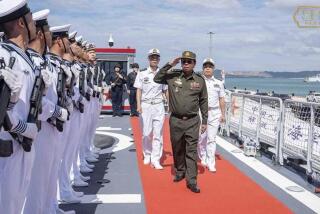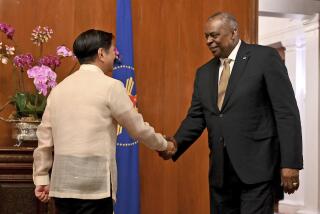Talks Open on U.S. Bases in Philippines : Military: Violent protests mark the opening of negotiations a day after guerrillas killed two U.S. servicemen.
- Share via
MANILA — Negotiators began talks today on the future of U.S. military bases in this country, a day after suspected communist guerrillas shot and killed two American servicemen near one of the installations.
Truncheon-wielding police fired tear gas at hundreds of anti-base protesters during running confrontations through the streets of the capital.
At least 42 people were arrested and five hospitalized, witnesses and police said. Protesters, mostly students, retaliated by throwing small homemade bombs at police.
Rallies were held throughout the day and security was tight for the talks, which opened at the Central Bank building with about 500 police on hand. Five truckloads of riot police were deployed before the gate at Clark Air Base as about 400 base opponents rallied in nearby Angeles City.
U.S. and Philippine officials had expressed fears that the communist New People’s Army would try to kill Americans before the talks on extending the lease on Clark and Subic Bay naval base as well as four smaller facilities. The lease is set to expire Sept. 16, 1991.
As the talks opened, the chief U.S. negotiator condemned the killings of the two U.S. airmen near Clark on Sunday and assailed the “banditry” of communist rebels, blamed by authorities for the attack.
“This brutal and clumsy attempt to drive a wedge between the United States and the Philippines will fail,” said Richard Armitage, a former assistant secretary of defense.
Police Capt. Gener Manguni said it appeared that the rebels were responsible for the killings because of the style of the attack. Two or three Filipinos approached the Americans and shot them in the back of their heads with .45-caliber pistols, the rebels’ favored weapon in street killings.
Police rounded up more than 200 people for questioning in the attack but no charges were filed.
The Navy banned off-post leave for the 40,000 troops, Defense Department civilians and military dependents at U.S. installations in the Philippines.
Eight Americans have died in politically motivated slayings in the Philippines since April, 1989.
In Manila, about 3,000 militant workers gathered in a city square as speakers denounced the bases. “Americans must be driven away,” Crispin Beltran, chairman of the May First Movement, a labor federation, told the crowd. “And those who refuse must be buried here.”
Later, the group tried to march to the U.S. Embassy but was blocked by police. The protesters placed a plywood placard bearing a base “eviction notice” on a traffic island in front of the embassy.
President Corazon Aquino told reporters that the government was taking “all necessary measures” to protect Americans but “we cannot guarantee a 100%, fail-safe protection. No government can.”
More to Read
Sign up for Essential California
The most important California stories and recommendations in your inbox every morning.
You may occasionally receive promotional content from the Los Angeles Times.













